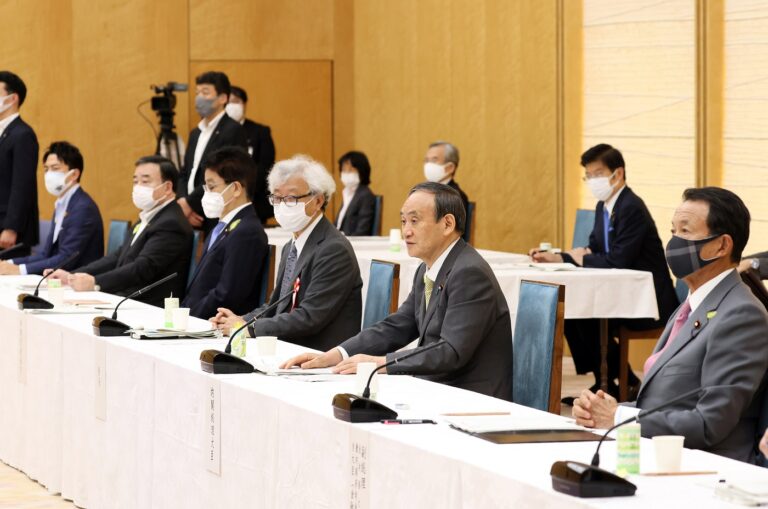
July 2021
This month’s edition of Policy Radar covers developments in Energy, Finance and Cryptocurrency. This month’s focus is on the recently approved land purchase law.
Month Focus: Parliament Approves Bill Restricting Foreign Access to Land Purchases
After years of debate, the land-purchase bill was passed by both houses of the Diet. In a move the government says is necessary to strengthen national security, the acquisition and use of land around infrastructure deemed critical to national security will be subject to government control.
Since its inception within the Liberal Democratic Party, the law has faced fierce opposition from both the opposition parties and the LDP’s junior coalition partner, Komeito. Komeito was initially worried about the law’s impact on private rights and economic freedom. However, it got on board after the LDP agreed to reduce the number of areas to be subject to government restrictions and to ensure urban areas are excluded from government monitoring, unless such a designation is deemed reasonable.
Meanwhile, the Constitutional Democratic Party criticized the bill for its lack of clarity on what areas would be subject to government scrutiny. The opposition still worries that the legislation could infringe upon individual rights and give excessive prerogatives to the government.
LDP lawmakers and a government panel have called for stricter regulations on land ownership after foreign entities started acquiring sites on the island of Tsushima and near a Self-Defense Forces base in Hokkaido.
The government still must create guidelines on what constitutes core infrastructure, as well as how land use is to be regulated. The Minister in charge of Territorial Issues, Okonogi Hachiro, said that it is necessary to take all possible measures to prevent security issues. Chief Cabinet Secretary Kato Katsunobu has defended the bill, saying it is necessary for national security.
Want to Stay Informed?
Sign up for monthly updates on the latest political developments impacting your industry in Japan:

The newly passed land law puts land within a 1-kilometer radius of facilities deemed critical to national security under government scrutiny and control. This would allow the government to collect information on property owners and issue recommendations and orders on the usage of the property (suspension of land usage is under consideration). Candidates wishing to purchase land under government scrutiny will also be required to submit personal details, as well as the planned use of the property. If companies or individuals do not abide by government orders or regulations, they will face penalties with fines of up to 1 million yen, or up to six months imprisonment. A further level of scrutiny is being contemplated for land close to SDF command centers and remote islands. The bill stipulates that the government must be notified before any land purchase is completed in these areas.
From now, local governments will share their opinions on what constitutes a district of national security through parliament, after the committee on the Cabinet passed a resolution requesting the national government hear municipalities’ positions. Prior to approval of the resolution, a heated debate ensued on the ramifications of the bill and the infringement of the privacy of Japanese citizens.
The enactment of the land purchase bill has faced enormous backlash from citizens in Okinawa in particular, with some arguing the law targets locals near military bases. Some citizen associations and local municipalities have criticized the lack of government clarity on the bill’s necessity and the future process for designating “special monitored zones.”
The law will take full effect in fiscal 2022.
Energy:

METI Reveals Draft of Next Basic Energy Plan
Under the Basic Act on Energy Policy, Japan revises its Basic Energy Plan every three years. The current plan, which calls for increasing the share of non-fossil fuel energy to slightly below 50% by 2030, was approved by the Cabinet in July 2018. In October last year, the Ministry of Economy, Trade and Industry (METI) began discussions on revisions to the country’s medium- to long-term energy policies. Following Prime Minister Suga Yoshihide’s announcement that the country would become carbon-neutral by 2050, the focus has been on revising the current targets for the power source mix of thermal power, renewable energy, and nuclear power. The draft of the Sixth Basic Energy Plan includes policies to maximize the implementation of renewable energy, with solar as a main power source, as well as promoting the practical application of hydrogen and carbon-capture technology. The draft of the Basic Energy Plan is to be finalized in August, followed by a Cabinet decision in October this year.
Langley Insight: On nuclear power, the revised text merely noted that “the necessary scale of nuclear power plants will be used in a sustainable manner.” With no concrete plans for the construction of new nuclear power plants or replacing existing ones, which proponents demand, the government’s stance on nuclear power remains ambiguous. While some have hailed the revision as a milestone that indicates the country’s path toward realizing a carbon-neutral society, Japan’s commitment to its carbon goal is less clear.
Ministry of Environment to Create New Grants to Aid Regional Decarbonization
To advance the Regional Decarbonization Roadmap adopted by the Cabinet last month, which aims to create a carbon-neutral Japan by 2050, the Ministry of Environment will include the costs for a new grant system to support local governments’ decarbonization efforts in its planned budget request for FY2022. According to the Roadmap, over the next five years the government will promote the use of renewable energy and electric vehicles, as well as improvements in the energy efficiency of buildings that will need to be implemented over a longer period. The central government plans to provide comprehensive assistance to local governments in achieving carbon neutrality over multiple fiscal years, including the provision of grants to more than 100 areas across Japan designated to lead efforts in achieving zero emissions by 2030. The government is also considering using its special budget account for energy to finance the new grant system. Details, including costs to be requested, will be decided before the budget request is made this summer.
Ministry of Environment to Boost Solar Panel Installations
The Ministry of Environment will revise the target for solar power generation in FY2030, adding about 20 million kilowatts — the power generation equivalent of 20 nuclear power plants — to the initial target. Under the government’s current plan, solar power generation capacity for FY2030 is set at 64 million kilowatts. As of FY2019, around 56 million kilowatts have already been installed, and the government expects capacity will reach about 88 million kilowatts in FY2030 at the current pace. The revised target will be more than 108 million kilowatts of solar power generation by FY2030, 1.7 times the current target. The Environment Ministry has set up three priority areas: the public sector, businesses, and local communities, with specific initiatives and introduction targets laid out for each one. 6 million kilowatts are to be secured by installing solar power generation equipment in 50% of the eligible buildings of national and local governments by FY2030. 10 million kilowatts are to be secured through publicizing power purchase agreements that allow solar panel installation at no initial cost and promoting the installation of self-consumption power generation equipment in buildings and parking lots among businesses. 1,000 cities, towns, and villages are expected to install about 4 million kilowatts worth of equipment on public land and in municipalities designated to promote decarbonization. While Environment Minister Koizumi Shinjiro advocated a solar panel mandate for new homes, his proposal was rejected by the panel meeting of experts from the Ministry of Land, Infrastructure, Transport and Tourism; the Ministry of Economy, Trade and Industry; and the Ministry of Environment. Instead, new housing will be required to meet energy conservation standards, such as the use of insulation, and the government is also considering raising the energy conservation standards for buildings and other large-scale structures to encourage decarbonization. Details, including the timing of implementation, will be worked out through necessary legislative amendments.
Langley Insight: The push for solar panel installation follows the Cabinet’s decision to make it one of the priority measures under its Regional Decarbonization Roadmap. While expanding solar power generation is seen as key, the lack of consideration for implementation may hinder the nation’s efforts to reach the 2050 carbon-neutrality target. Opposition to mega-solar power plants has been strong throughout the nation, and the recent devastating landslide in Atami, Shizuoka Prefecture, has seen the LDP’s Special Committee on Disasters call for an investigation on the link between mega-solar power plant projects and mudslides. More backlash is to be expected. Moreover, despite the imposition of import bans by the U.S. and EU on key raw materials found in most solar panels from China over forced labor allegations, the Japanese government has refrained from taking concrete measures. With the Xinjiang labor issue pushing up the prices of solar panels, the government needs to reconsider the risks of its current dependence on China for materials and devices key to solar power generation.
Finance:
METI Minister Says more Measures Needed to Protect Against Activist Investors
METI Minister Kajiyama Hiroshi has said that corporations key to national interests and security require government protection from activist investors after a scandal involving METI officials colluding with electronics-maker Toshiba came to light. The minister revealed that the government will study deterrence measures in the case that a business’ operations and research and development are threatened by foreign shareholders. He also reiterated that there was no wrongdoing from a legal standpoint by METI officials. METI is worried that the country’s current foreign investment rules under the Foreign Exchange and Foreign Trade Act are not sufficient to protect the activities of major domestic enterprises. A revision of the law came into effect just last year, allowing the government to review deals with foreign companies in sectors crucial to national security when the purchase amounts to 1% or more in a domestic company. However, the law only allows for review and screening before the purchase; regulators cannot intervene after the deal is carried out if new issues arise. The minister said that the measures to be taken need to be directed at both foreign and Japanese stakeholders.
Government Aims to Double Amount of Foreign Executives and Foreign Investment
The Japanese government wants to increase the number of foreign executives to grow the country’s attractiveness as a foreign investment target. A government plan mentions doubling the number of senior foriegn executives by 2030, with a goal of having about 200,000 individuals under the business manager visas (there were 95,000 in 2019). By doing this, the government hopes to double the amount of foreign direct investment to 80 trillion yen by 2030. The government wants to bring that investment to local economies, as well as Tokyo. The government wants to double the proportion of foreign operations outside of Tokyo to 10,000 by 2026. To do so, the government will incentivize research partnerships and joint ventures with companies located in regional areas. Furthermore, the Japanese government is ready to ease visa application processes for new businesses.
Langley Insight: Despite different regulation initiatives that seek to restrict non-Japanese access to numerous industries (those considered vital to national security), the Japanese government is serious about attracting foreign investment to Japan. This was seen recently in the semiconductor industry, where the Japanese government helped foreign companies tie up with domestic ones. The government has established a framework to promote cooperation between foreign startups and domestic mid-sized enterprises in rural areas to advance digital transformation in rural economies. METI is helping by selecting partnerships and assisting in setting up meetings and carrying out market research. The program is outlined in the fiscal 2021 budget and targets five specific areas: decarbonization, healthcare, mobility, retail and agritech.
Cryptocurrency:
Government to Provide Greater Clarity on Digital Currency by End of 2022
The head of the LDP’s panel on digital currencies, Murai Hideki, said that the government will provide more clarity on what Japan’s digital currency, the digital yen, will look like by the end of next year. However, neither the Bank of Japan (BOJ) nor the government is expected to make a decision on whether to issue a central bank digital currency (CBDC) by then. The release of more details by the BOJ is expected to spur debate about how a digital currency could affect financial institutions. The BOJ wants to move to the second phase of a pilot program where it can lay out key functions and details of a digital yen. The BOJ believes that a national digital currency would not interfere with private businesses, according to the LDP’s Murai. The LDP lawmaker also argued that if commercial banks are key intermediaries of CBDCs, there is concern about data flows. He believes that issuance of a digital currency could have a large impact on financial institutions and settlement mechanisms, reshaping the whole of Japan’s financial system. Furthermore, he highlighted the need to make Japan’s digital currency compatible with digital currencies from other developed nations. Murai expressed his concerns about the digital yen losing face to the digital yuan if the latter is popular and becomes the main settlement for trade with Japanese businesses.
Langley Insight: The BOJ began experimenting with CBDCs from April this year in a concept program with three different stages. The first stage consists of a proof of concept, which is to be finalized by the end of fiscal 2021 and a second stage with development phases to be completed by fiscal 2022. The final stage will see a financial experiment in which both individuals and private businesses will use CBDCs in a selected area. The Digital Money Promotion Project Team within the LDP’s Financial Research Council has been calling for accelerated efforts to issue a digital currency as China attempts to internationalize its digital yuan. So far, the BOJ has been taking numerous steps comparable to those of other central banks in G7 countries, but it remains cautious as it still wants to see what the FRB in the U.S. and the EU’s ECB will do.
Langley Esquire provides a full range of government & public affairs consulting services, including policy & media monitoring, stakeholder mapping, strategic communications, procurement and government relations. We craft unique solutions tailored to meet our clients’ needs across industry sectors including technology, energy, healthcare, finance, transportation & infrastructure, defense, and beyond.
As the outbreak of the COVID-19 pandemic continues to bring unprecedented impact around the world, public and private sectors rush to adapt to a rapidly-changing global environment. While there is uncertainty for what lies ahead, new opportunities emerge for public-private partnerships. Every day brings new insights, opportunities, and technology that affect Japanese politics, business, and society.
If you are struggling to make sense of policymaking and engage your key stakeholders across government, media, and academia, contact us to learn more about what we can accomplish for you.
Be the First to Receive Future Updates!
See Related Content:

Digital Agency Overview: Japan’s Digitization Push Gets in Gear
The Digital Agency has been officially launched with the aim of updating the country’s outdated digital infrastructure. Will this time be different?

Going Digital: The Future of Healthcare in Japan
In this series of articles, we examine the Japanese government’s push to transform the private sector into a technological powerhouse.

Timothy Langley Featured In Nikkei Asia On New Digital Agency
Langley Esquire CEO Timothy Langley was quoted in Nikkei Asia on Japan’s incipient digital agency and the challenges it will face — both from the private sector and other government bodies.
